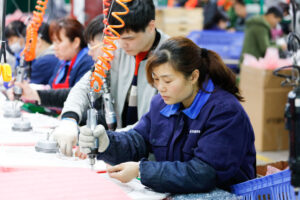
Britain has paid a fine of more than £2.3 billion to Brussels for allowing Chinese gangs to flood Europe with cheap clothes and shoes.
In an announcement slipped out before the parliamentary recess, the Treasury revealed it had paid the European Union to settle a long-running dispute over lax customs checks when Britain was a member of the bloc.
The sum, which would be enough to give nurses a pay rise of about 3.3 per cent, has been paid in three instalments over the past seven months, and includes hundreds of millions of pounds in interest because the government did not settle earlier. Meg Hillier, chairwoman of the public accounts committee, described the sums involved as “shocking” and said MPs would demand answers from ministers and officials “about how this was allowed to happen”.
An EU fraud investigation found that over a six-year period HM Revenue & Customs failed to check impossibly low valuations put on Chinese consignments arriving into Britain. In one case it found that the average value declared at the UK border for women’s cotton trousers was €0.91 per kg, compared with an EU average of €26.09.
Customs duty is charged at 12 per cent of the declared value. This meant fraudsters could make huge savings by declaring the goods in the UK and exporting them to the rest of Europe, undercutting domestic producers.
British ministers repeatedly denied liability, claiming they “did not recognise” the estimate of “alleged duty loss”.
The EU took its case to the European Court of Justice, which ruled last year that Britain had “failed to fulfil its obligations” under laws to combat fraud.
It found that more than half of all textiles and shoes imported into Britain from China between 2011 and 2017 were below “the lowest acceptable prices”. It ordered the UK to pay more than €2 billion, plus interest.
The Treasury minister John Glen revealed in a written statement that Britain had now settled what it described as a “legacy matter” from its time as an EU member state. “The government is keen to resolve this long-running case once and for all and is committed to fulfilling its international obligations,” he said. “These are substantial sums but represent the final payments.”
A government spokesman said that by settling the case now ministers had protected taxpayers “from the risk of further protracted legal proceedings and a potentially bigger bill”.
He added: “Outside of the EU we can set our own law, including tax and trade policies, that work for the UK. We take a robust approach to tackling fraud risk and evolve our response as any new potential threats emerge.”
When Britain was a member of the EU it had a responsibility to ensure that the correct duties were paid on all imports arriving in the country. However, all revenues were sent to Brussels as part of general EU funding which, critics have claimed, provided little incentive to carry out rigorous checks on the declared valuations of imported goods.
Read more:
Britain pays £2.3bn fine to EU over cheap Chinese imports






